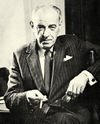The High Wire: Difference between revisions
imported>Hayford Peirce (rewriting the lede to reflect this particular book) |
imported>Hayford Peirce (High Wire, not Hire Wire) |
||
| Line 4: | Line 4: | ||
{{Authors|Hayford Peirce|others=y}} | {{Authors|Hayford Peirce|others=y}} | ||
'''The | '''The High Wire''' is a 1963 suspense novel by the British author [[William Haggard]] published in England by [[Cassell (publisher)|Cassell]] and in the United States by [[Ives Washburn]]. It was Haggard's fifth of 21 books involving his protagonist [[Colonel Charles Russell]], the head of the unobtrusive but lethal Security Executive, a government counter-intelligence agency clearly based on the actual [[MI5]] or Security Service, where he moves easily and gracefully along [[C.P. Snow|C.P. Snow's]] [[Corridors of Power (novel)|Corridors of Power]] in [[Whitehall]]. It has noticeably less detailed examinations of character and motivation than Haggard's earlier books and considerably more elements of standard suspense thrillers, particularly regarding action and gun-play. | ||
==Plot== | ==Plot== | ||
Revision as of 15:39, 12 October 2020
Authors [about]:
join in to develop this article! |
The High Wire is a 1963 suspense novel by the British author William Haggard published in England by Cassell and in the United States by Ives Washburn. It was Haggard's fifth of 21 books involving his protagonist Colonel Charles Russell, the head of the unobtrusive but lethal Security Executive, a government counter-intelligence agency clearly based on the actual MI5 or Security Service, where he moves easily and gracefully along C.P. Snow's Corridors of Power in Whitehall. It has noticeably less detailed examinations of character and motivation than Haggard's earlier books and considerably more elements of standard suspense thrillers, particularly regarding action and gun-play.
Plot
Protagonist is perhaps too strong a word to describe Colonel Russell. As Haggard himself wrote about his fiction:
My novels are chiefly novels of suspense with a background of international politics. A Colonel Charles Russell of the Security Executive, a not entirely imaginary British counter-espionage organization, while not a protagonist in the technical sense, holds the story line together in the background by his operations, while the characters in the foreground carry the action."[1]
Reception and/or Appraisal
Reviews were favorable:
The New York Times: xxxxxx [2]
Kirkus Reviews: xxxxxx [3]
